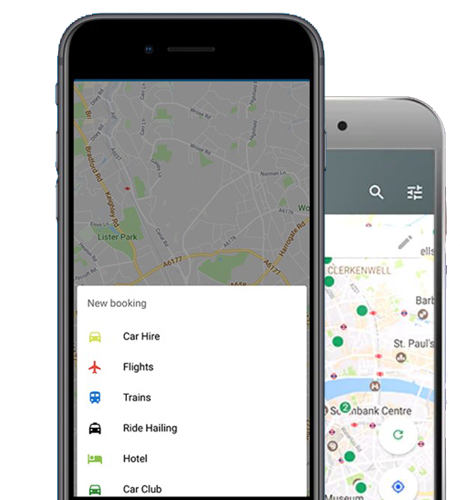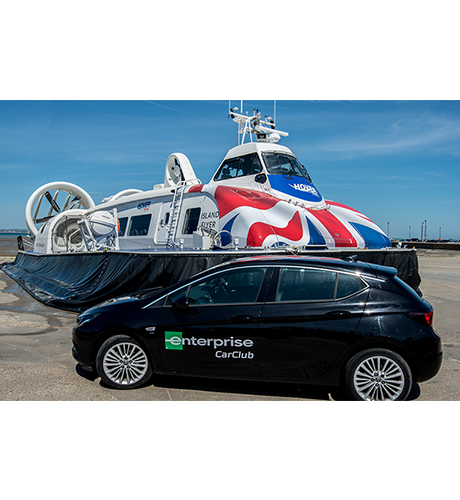An Alternative to Ownership
Enterprise Car Club champions the adoption of shared transport systems and is keen to make it easier for travellers to seamlessly switch between car, bike, bus, train, tram and other shared transport modes to complete their journeys. We recognise the social and environmental benefits using transport rather than owning it can bring, and are keen to see such sustainable ‘modal shift’ embraced by individuals, businesses and governmental organisations alike.
Mobility as a Service (MaaS)
Mobility as a Service sees digital transport service platforms that enable users to access, pay for, and obtain real-time information on a range of public and shared transport options. Enterprise has invested in a MaaS platform and is working with a number of councils around the country to ensure travellers have access to a shared vehicle within a hierarchy of travel options. This means they can easily hire a car by the hour or day at a convenient location for those journeys that are not possible by public transport alone.
Dovetailing with other transport modes
Where feasible, Enterprise Car Club aims to complement other forms of shared and public transport by positioning shared community vehicles close to bike, ferry, train and bus stations and terminals. This is designed to encourage the combining of transport modes to undertake more sustainable and cost-effective journeys. Vehicles can, for example, be found either side of the Isle of Wight ferry, and located within 500 metres of 181 mainline and regional rail stations around the country. This means that, based on estimates of the number of train journeys during 2017 and 2018, more than a quarter (27%) of all UK journeys by rail either begin or end within reach of a Enterprise Car Club bay. Search our fleet at train stations here.
Mobility Hub Creation
Mobility hubs combine many types of travel in a single physical location: on-street car club vehicles parked next to public transport such as train stations or bus stops and bicycle facilities such as cycle parking or bike share schemes, with real-time transport information and enhanced public space for pedestrians and local residents.
Mobility hubs combine many types of travel in a single physical location: on-street car club vehicles parked next to bus stops and bicycle parking, with real-time transport information and pedestrian facilities. An Imperial College London trial found that when employees were given free access to a hub near work, almost two thirds (63%) of participants planned to cycle more and 25% said they would be less likely to commute using their own car after the “positive” experience of using the mobility hub.
For more information, please visit the CoMo Mobility Hubs page.
Ride Sharing & Car Sharing
In 2019 it was estimated that there were 36 million empty car seats every morning on the UK commute, with the average car occupancy at only 1.2.*
Enterprise Car Club has partnered with ride sharing pioneers Liftshare to help groups of people share a single hybrid or electric car club vehicle for their daily commute, helping reduce dependency on older, often higher-polluting household vehicles. Find out more about this exciting partnership here.
*Centre for Research into Energy Demand Solutions (CREDS). University of Oxford
Urban Mobility Partnership
Enterprise Car Club is working with the Urban Mobility Partnership (UMP) a coalition committed to providing long-term leadership and near-term solutions to improve future urban mobility. The innovative partnership represents the breadth of the urban mobility landscape. Together they aim to ensure that effective policy at a national, regional and local level, combined with new technology, supports better mobility and helps tackle the major challenges of congestion, air quality and climate change.
In conjunction with the partnership Enterprise heavily involved in the delivery and advocacy of mobility credits, reduction in business travel grey fleet spend and planning for mobility.
Enterprise Car Club & Active Travel
By taking private vehicle ownership off the road, Enterprise Car Club creates space for active travel, making it safer and more attractive to the wider community. Car Club members themselves after joining are likely to walk more and cycle more than they did prior to obtaining membership. Research shows that 37% of car club members cycle at least once per week, compared to 20% of non-members*. This is because car club members have a greater propensity to opt for active travel modes for smaller localised journeys, using a car only when really needed. Find out more about active travel here.
*2021 research from shared transport charity Collaborative Mobility
Other resources
If you'd like to read more about Mobility as a Service as a movement in the UK, please see these resources





